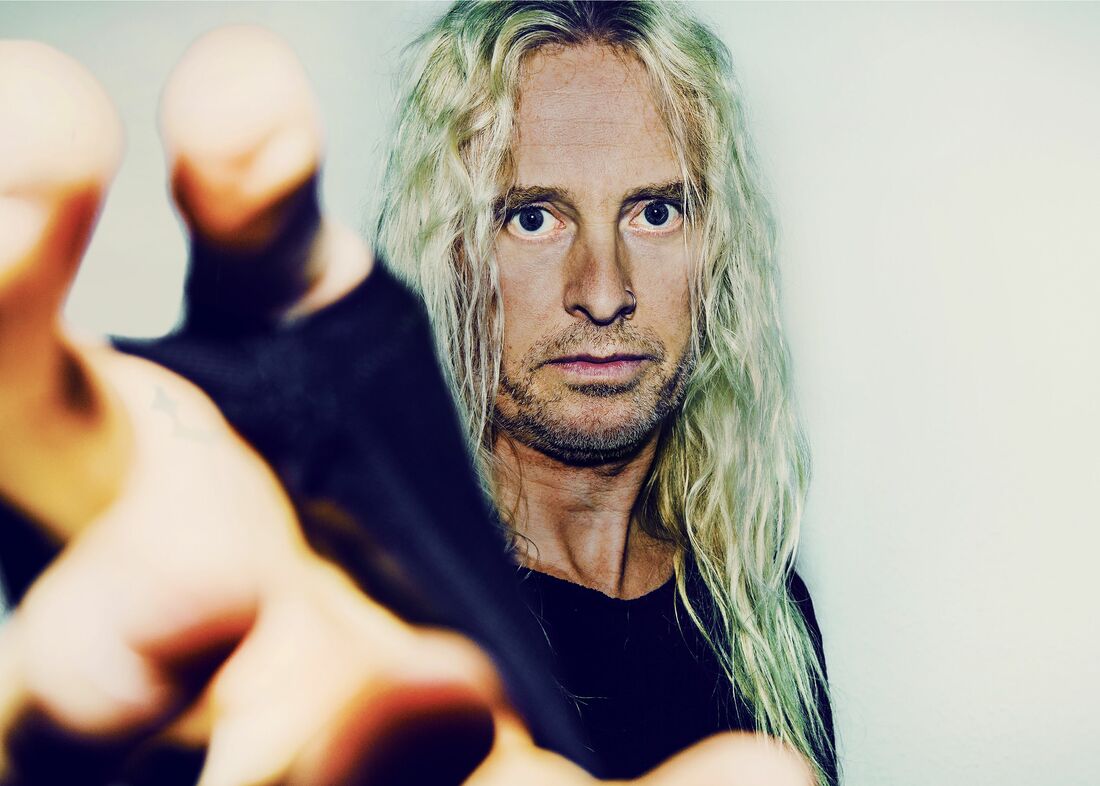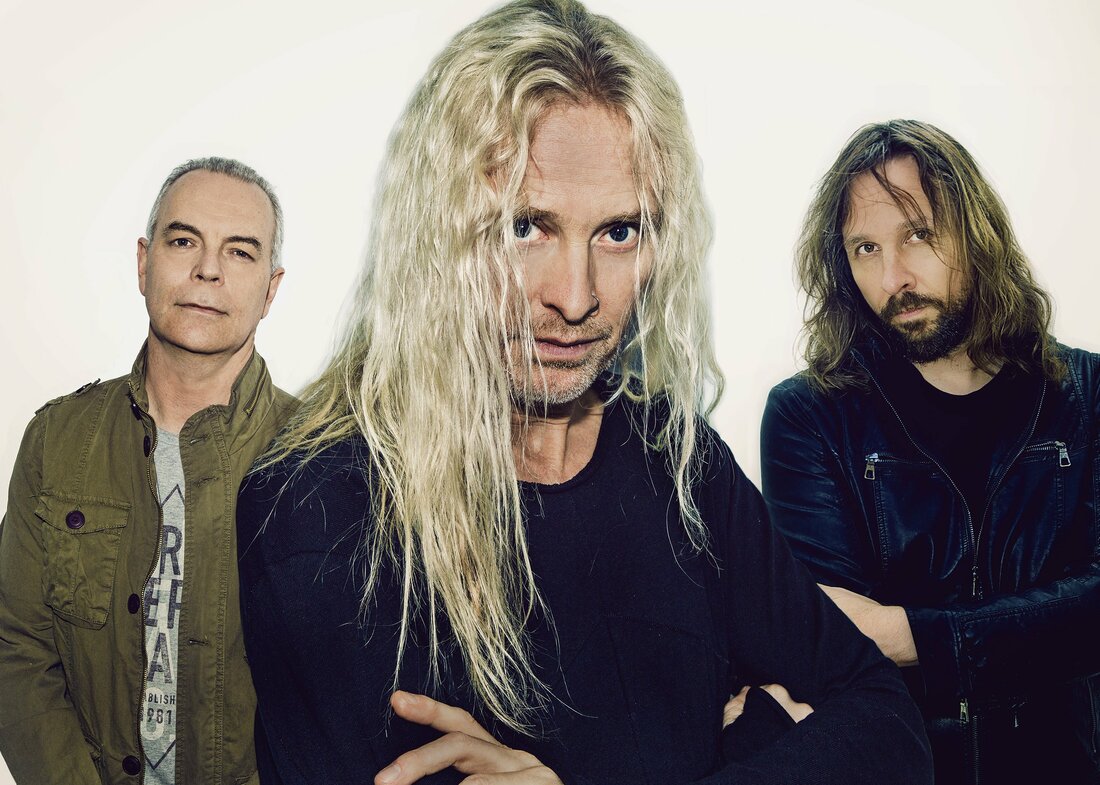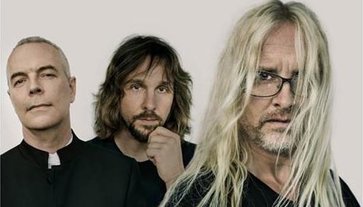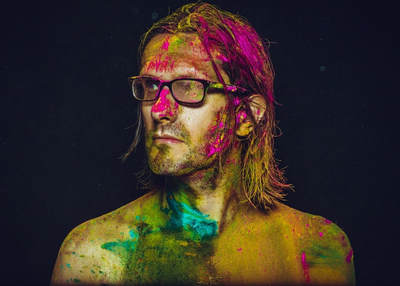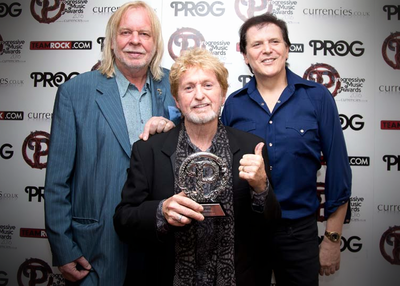|
Nick Beggs is one of the busiest players in music. A regular collaborator with Steve Hackett, having just completed a mammoth tour as part of Steven Wilson’s band, he’s about to release a new album from his own Mute Gods. The third from the project he formed with keyboard player Roger King and drummer Marco Minnermann, ‘Atheists and Believers’ is an emotional roller coaster. We sat down with Nick to chat the Mute Gods, and how he went from Kajagoogoo to prog’s most in-demand player. Knucklehed; Eamon O’Neill.
Hi Nick, how are you today?
I’m actually quite well. I’ve been away for seven weeks on the road. This last year we’ve [Steven Wilson band] done 33 countries, and 145 shows. I got back a couple of nights ago, and I’m really grateful to be home. I’m just kind of settling back into suburbia. How was that trek for you? Well, it’s business as usual. It’s important to go out and promote records and support artists and all the rest of it, and that’s what I’ve been doing for the past 37 years. It just feels like; okay, this is my office – it’s the way it works. But it is tiring when you have something that is so concentrated. The Steven Wilson tour included three nights at the Royal Albert Hall, which must have been a high point for everyone in the band. Yes. It was a buzz, very much so. I’ve played there a few times now, with a couple of other artists, but each time with Steven, he seems to add on another night, so it’s pretty indicative of a growing artist. It’s nice to be part of it. The Mute Gods are about to release new album ‘Atheists and Believers’; what’s it like becoming the boss again? Well, there is a responsibility, but there’s also a kind of artistic baton which I wanted to run with. The heart of what I’ve been doing starting out, was I learned how to be a writer. That’s a very refined skill; you hone it down over a long period of time, both by making mistakes and having triumphs. It’s the third release from the Mute Gods. It felt like the techtonic plates of the music plates of the music industry were moving together to conspire to give me a platform, which I never really thought would have happened after so long. I thought I’d never really be forgiven for my crimes against fashion in the 80s. I thought I’d never really be forgiven for my crimes against pop music in some ways, because I think that Kajagoogoo is definitely Marmite; you either love it or hate it. I understand that, and I take full responsibility, but I traded on that. I kind of made almost a Faustian pact of; “Do you really want to do that? Are you sure that that’s the right thing to do?” And I thought; “I want this to go into the goal from the other side of the field. I don’t want there to be any nebulous aspects about this; I want this to be an absolute, down the middle of the pitch goal.” You were extremely focused on what you wanted Kajagoogoo to be? We all thought along the same lines. We set out to make something that kind of, was viral, almost, in the way we looked, because we knew that we could trade on a certain type of asset; the way that it would sound, and the way that we could play. Each one of us had our own speciality, and we wanted to make it interesting; almost if it was a comic book thing. And it worked astonishingly well, right up to the point where it didn’t work anymore. It’s a long way from where you are now with the Mute Gods. I didn’t think I’d be given those opportunities again, and so, thirty-five years later, for a number of record labels to be saying to me; “Listen, there’s people out there who are interested in what you’re doing, and we’re prepared to support that”, was surprising. It’s apparent though, that there is a hard core Nick Beggs fan base out there. [*Laughing*] Yes! Yes, there is, and it’s lovely, it really is. And I’m surprised I haven’t ticked them all off actually, with my outspoken devil-may-care attitude towards things. But I thank them all for indulging me. Actually, I know I have lost fans by the things I’ve said. Some of it seems outrageous, and some of it seems insulting, and some of it seems absolutely insane, but, from where I’m sitting, it always makes perfect sense. It’s the state of the world and the universe. The first song to be released on the album is the title track, which does seem to carry over the pop sensibilities from your past.
You can take the boy out of the pop, but you can’t take the pop out of the boy - not without serious surgery, and I don’t think the patient would live. It’s endemic to what I do, really, and even when I’m working on more complicated music, I’m still thinking about refining the pieces to make them as succinct as possible, but actually reward the audience with a payoff. Even in progressive music there’s hooks - if I can use that term. I mean, I don’t really see myself as a progressive artist; there just seems to be the field, the landscape where I’m actually being given an opportunity. Sometimes I feel like some of the progressive fans feel a little bit duped; I think they were expecting a little bit more irregular metre, and little bit more cognitive dissonance. And that’s fair enough; I don’t really see myself as a progressive artist; I don’t think I belong. I feel like an imposter. Steven Wilson has told eonmusic that if you truly are progressive, then you don’t tag yourself as such. I think there’s truth in that. I know that Andy Latimer [Camel] never liked the term, I know the guys in Pink Floyd never really liked that term. I think the Genesis guys got sick of it, and definitely wanted to move on from it. That’s not to say that that music isn’t great, because it is, and I love it. It’s a wonderful, expansive terrain of music, which has stirred up a whole new generation. This seems to be an extremely personal album, especially in songs like ‘The House Where Love Once Lived’. I think all the songs on three Mute Gods albums are personal to me. They all have some path back to me, directly; there’s a trail of breadcrumbs that you can trace all the way back to me, on every one of those. In terms of ‘The House Where Love Once Lived’, it’s about my failed marriage which broke down twenty-five years ago. We have a daughter who’s twenty-eight now [Lula], who I have a wonderful relationship with, and she sings on the record. We have a very deeply profound relationship. Anyone who has gone through a divorce with children involved will tell you; it’s viscerally painful. The song is about being in a home that has inherited those memories; those pains, but those joys as well, because they were good times that went bad. The other track that’s really touching is the instrumental ‘I Think of You’, which closes the album. I wrote that track before I wrote any other song for the Mute Gods. I wrote it probably about ten years ago. It was just a piano motif which went through that whole development; I’d go back to it and listen to it and add bits to it; the middle string section and the oboe section, and the wind chimes. And then when it came to it, I thought; “I want to finish this record in a very different way. I feel like I’ve said everything that I need to say musically and lyrically; what do I want to say emotionally?” And I thought I’d like to say something about my mother’s death, about the profound loss of her when I was a seventeen year old, before I’d even begun to make my way in the world. At the actually crux of my being, she died, and left me on my own with my sister. And I had to make sense of everything. That’s quite a change in tone, compared to what comes before it. I thought it would be a very eloquent close to the record, because there’s so much anger and rage on all three of the records - not least of all this one - that I felt; “I’m going to cradle, be gentle with the audience”. In fact, Roger King refers to that track as the; “I’m sorry I hit you” track! [*Laughing*]. Well, you are calling us all ‘Knuckleheds’ at one point! Yes, that’s right! I love that. I thought it was very eloquent, because it starts off with ‘Iridium Heart’, which is a rant against society and the world, and then it goes into this railing, anti-religious thing with ‘Twisted World Godless Universe’, and then it goes into this meditative kind of catharsis. And I can live with that. That’s fine. I’m prepared to take a risk, because I knew it was a risk; it’s a complete polar opposite. It is an achingly beautiful piece of music. It’s about relinquishing. It’s about grieving, but it’s about letting to. And actually, apart from the wind chimes on it, I’m not playing anything. My original piano part, when I played it, I played it to a click, so it was metronomically in time, but Roger said; “I think it should be more rubato; it should have more ebb and flow in the tempo”. And he re-recorded the whole part as I’d recorded it, but in free time, so you’ll find it moves in times like a wave. And then, the parts that I’d written in the middle section, Robert Townsend played them on oboe and clarinet. I like that I’m the composer, but I’m actually not playing anything on it, apart from the wind chimes, which begin and end it. Going back a few years, and VH1’s ‘Bands Reunited Kajagoogoo’ presented a very different Nick Beggs.
When VH1 came knocking on our door that day in 2003, I’d been playing with ABC for five years, I’d just finished working with Right Said Fred, and I had a production deal with a Japanese company, as I’d put a girl band together and had a hit in Japan with a band called Industrial Salt. And there was a tremendous amount of discourse between the members of Kajagoogoo, because there was a potential law suit between us and Limahl and Jez [Strode, drummer] appertaining to the name and backdated royalties. There was an awful lot of things going on, and that VH1 thing didn’t, initially bring about the immediate reform of the band. There was a re-imagined version Kajogoogoo going on in between times. We reformed as a three-piece without the other two after that because there were still problems over royalties. It wasn’t until a few years later that we managed to come to some kind of agreement. I tell you what I did, I actually called everyone up and said; “I’m prepared to do this, this and this, but this has to happen”, and that was it. And then suddenly, we had a tour, a re-release of the back catalogue, a new EP, press interest. So how did that lead to your becoming one of the most in-demand prog players around? I suppose, the thing is that you listen to what the world is presenting you. It’s based on; “Who am I? What am I doing? How do I get from here to here?” And it was pragmatism and opportunism. After that Kajagoogoo tour in 2007 or2008, Steve Hackett called me up. He said he’d seen me on the BBC with Limahl doing a breakfast tv interview, and said; “I really like what you’re doing.” I’m a huge Steve Hackett fan, and the Kajagoogoo thing, as happy as I was - and we were all happy to do it - but it was only going to be for a certain period of time. Although the others wanted carry with it, Infinitum; I didn’t. And when Steve Hackett said; “Do you want to come and join my band?”, that was it. It was clearly the right decision to make, given where it’s taken you. I think if I’ve done anything right in my life, I’ve listened to what’s happening, and The Mute Gods is no more than that; it’s no more than me listening to what’s happening and what’s available. In a way, I’ve kind of got to make some decisions now about where I go from here, because, in a lot of ways, everything’s come full circle. I’ve done three albums, I did ten years with Steve Hackett, seven years with Steven Wilson; I’ve got ‘what next?’ I’m kind of scratching my head. I don’t really know. At the beginning, you did state that the Mute Gods was going to make a trilogy of albums. I can’t see me doing another album with the Mute Gods. At the minute, I can’t. I’d like to do live, and I’m trying to make it happen. I’m talking to promoters and agents. It’s very difficult. It’s not as easy as you might think. I’m sort of seen as an unknown quantity, in some ways. So what’s next for you? Well, I’ve got this Mute Gods album coming out at the end of the month, and that’s important, but once you put an album out, that’s it; it’s like letting your children leave home; “Go and have a good life!” You don’t know how it’s going to go. You have to let it percolate. Have you any other plans for 2019? I’m working on a couple solo chapman stick albums which I’ll probably release this year. I’ve got another project with Craig Blundell [drummer for Steven Wilson, Frost*] and Adam Holzman which we are developing. I’m file sharing with Steven Wilson, I’m going to America with Howard Jones in three weeks for a brief tour. But these are piecemeal things. I would like to go on the road with the Mute Gods, do some great shows, and build up a brand based on that. At this stage, I’m not so sure how easy that’s going to be, so watch this space! Finally, will Kajagoogoo ever reunite? No, that won’t ever happen. That’s finished, that’s all done. I’ve moved on from that. As Ronan Keating said; “You say it best when you say nothing at all.” Very eloquent lyrics there. I’d rather just leave it alone, and let people remember it fondly, rather than try and rehash that old dog. Like this interview? Like us on FaceBook and follow us on Twitter for regular updates & more of the same. The Mute Gods' 'Atheists And Believers' is released on 22nd March 2019, via InsideOut Music. To pre-order, click here. |
|
Nick Beggs.
"Some of it seems outrageous, and some of it seems insulting, and some of it seems absolutely insane, but from where I’m sitting, it always makes perfect sense."
© 2016 - 2024 eonmusic.co.ukContact: [email protected]
|

